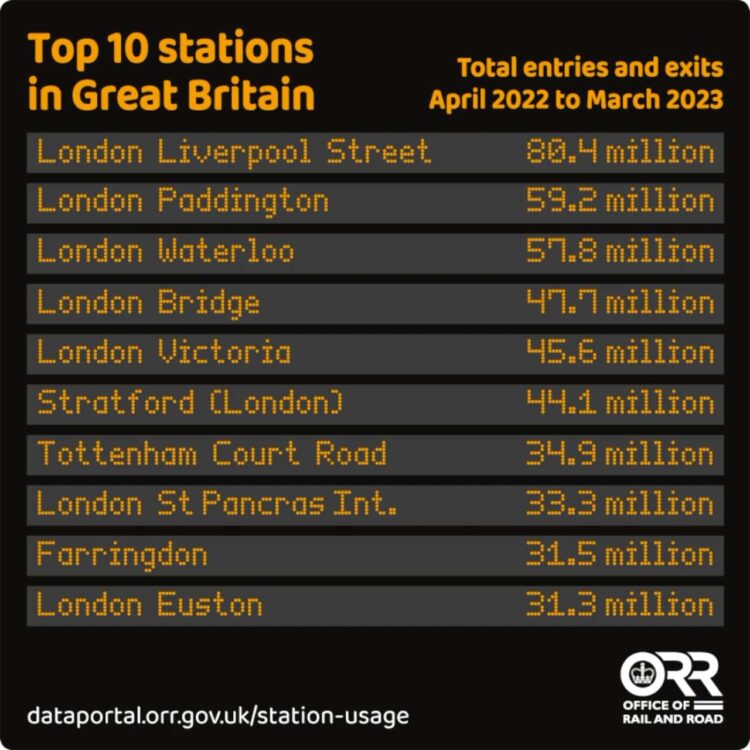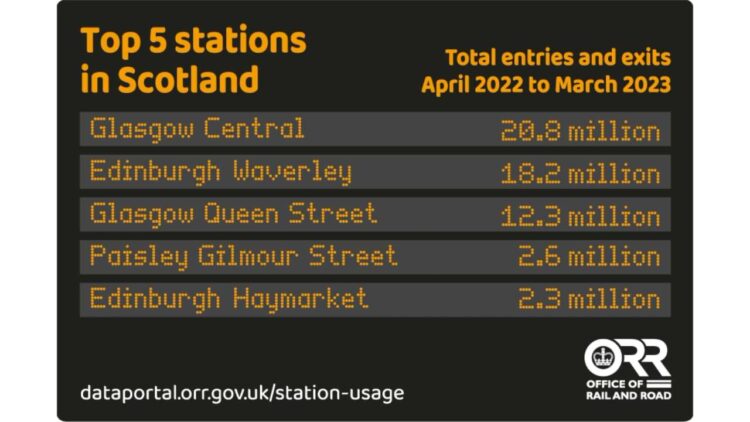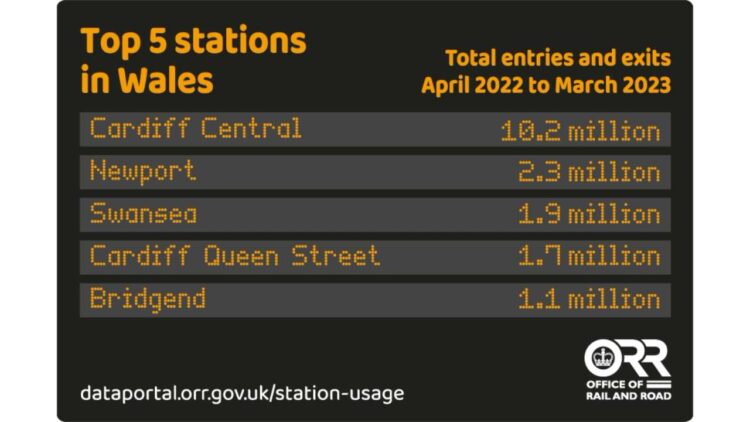New data shows most-used stations, with Elizabeth line making impact
London Liverpool Street[1] has replaced London Waterloo[2] as the most used railway station in Great Britain. The main reason for this is the opening of the Elizabeth line[3], which prompted a rise in entries and exits at the station of about fifty million, taking the total to almost 80.4 million.
The Office of Rail and Road (ORR)[4] today published data showing that the new Elizabeth line, which runs west-to-east across and beyond London[5], has also b0osted journey numbers at Paddington, Farringdon and Tottenham Court Road[6], which all feature in the top ten busiest stations.
Paddington was the second busiest station, up from sixth last year[7], while Farringdon has risen 29 places to number nine. Tottenham Court Road's Elizabeth line station opened in May 2022 and appears in the list for the first time in seventh place. London Waterloo drops down to third, and London Bridge to fourth.
Although the ten busiest stations are in London, the next three are outside the capital, with Birmingham[8] New Street in eleventh place, Leeds[9] twelfth and Manchester Piccadilly[10] thirteenth.
Glasgow Central[11] was the most used station in Scotland with 20.8m entries and exits and Cardiff Central[12] the most used in Wales[13] with 10.2m).
 Credit: ORR
Credit: ORR
The top ten, with their number of exits and entries, and their rank last year, are:
- London Liverpool Street, 80.4 million (4)
- London Paddington[14], 59.2m (6)
- London Waterloo, 57.8m (1)
- London Bridge, 47.7m (3)
- London Victoria, 45.6m (2)
- Stratford (London), 44.1m (5)
- Tottenham Court Road, 34.9m (new entry)
- London St Pancras International, 33.3m (12)
- Farringdon, 31.5m (38)
- London Euston, 31.3m (7)
These are the ten most used stations outside London, with the numbers of exist and entries:
- Birmingham New Street, 30.7 million
- Leeds, 24m
- Manchester[15] Piccadilly, 23.6m
- Glasgow Central, 20.8m
- Edinburgh Waverley, 18.2m
- Gatwick Airport[16], 16.5m
- Brighton, 14.1m
- Reading, 12.4m
- Glasgow Queen Street, 12.3m
- Liverpool Central[17], 11.4m
Teesside Airport was the least used station, but this is not surprising as it runs only one train per week (on a Sunday) and hs beem closed since May 2022 for after the platform was deemed unsafe.
The least used station that was open throughout the whole year was Greater Manchester's Denton[18] with thirty-four recorded entries and exits. Third-place Elton and Orston[19] in Nottinghamshire had been the least visited in the previous year with forty entries and exits, but has increased that number by sixteen (forty per cent) in this reporting year.
There were five open stations with one hundred or fewer entries and exits in the latest year:
- Teesside Airport, Darlington (two entries and exits), which is currently closed for repairs
- Denton, Greater Manchester (34), which is served by just one train per week, heading northbound on a Friday
- Elton and Orston, Nottinghamshire (56), which is served by just one train peer day in each direction
- Kirton Lindsey, North Lincolnshire[20] (94), which is served by a very small number of trains, on Saturdays only
- Reddish South[21], Greater Manchester (100), which is served by just one train per week, heading northbound on a Friday.
 Credit: ORR
Credit: ORR
For the first time, the ORR's report also presents data of the busiest flows between pairs of stations. Four of the top ten are on routes only served by the Elizabeth line. Top was London Liverpool Street to Tottenham Court Road with 5.8 million journeys. The busiest outside London was between Birmingham New Street and Coventry (2.1m).
Feras Alshaker, Director of Planning and Performance at the Office of Rail and Road, said: “Our official statistics released today show how the full opening of the Elizabeth line has changed the way people travel into and across the capital. Waterloo had been the busiest station in Britain for all but one of the previous 18 years. The busiest stations outside of London remain more stable with Birmingham, Leeds and Manchester leading the list.
“These statistics offer insight not only for the public but also for industry and planners, and we have continued to evolve them this year with the inclusion for the first time of data about journeys between stations.”
 Credit: ORR
Credit: ORR
References
- ^ Posts tagged with London Liverpool Street (www.railadvent.co.uk)
- ^ Posts tagged with London Waterloo (www.railadvent.co.uk)
- ^ Posts tagged with Elizabeth Line (www.railadvent.co.uk)
- ^ Posts tagged with Office of Rail and Road (ORR) (www.railadvent.co.uk)
- ^ Posts tagged with London (www.railadvent.co.uk)
- ^ Posts tagged with Tottenham Court Road (www.railadvent.co.uk)
- ^ last year (www.railadvent.co.uk)
- ^ Posts tagged with Birmingham (www.railadvent.co.uk)
- ^ Posts tagged with Leeds (www.railadvent.co.uk)
- ^ Posts tagged with Manchester Piccadilly (www.railadvent.co.uk)
- ^ Posts tagged with Glasgow Central (www.railadvent.co.uk)
- ^ Posts tagged with Cardiff Central (www.railadvent.co.uk)
- ^ Posts tagged with Wales (www.railadvent.co.uk)
- ^ Posts tagged with London Paddington (www.railadvent.co.uk)
- ^ Posts tagged with Manchester (www.railadvent.co.uk)
- ^ Posts tagged with Gatwick Airport (www.railadvent.co.uk)
- ^ Posts tagged with Liverpool Central (www.railadvent.co.uk)
- ^ Posts tagged with Denton (www.railadvent.co.uk)
- ^ Posts tagged with Elton and Orston (www.railadvent.co.uk)
- ^ Posts tagged with Lincolnshire (www.railadvent.co.uk)
- ^ Posts tagged with Reddish South (www.railadvent.co.uk)